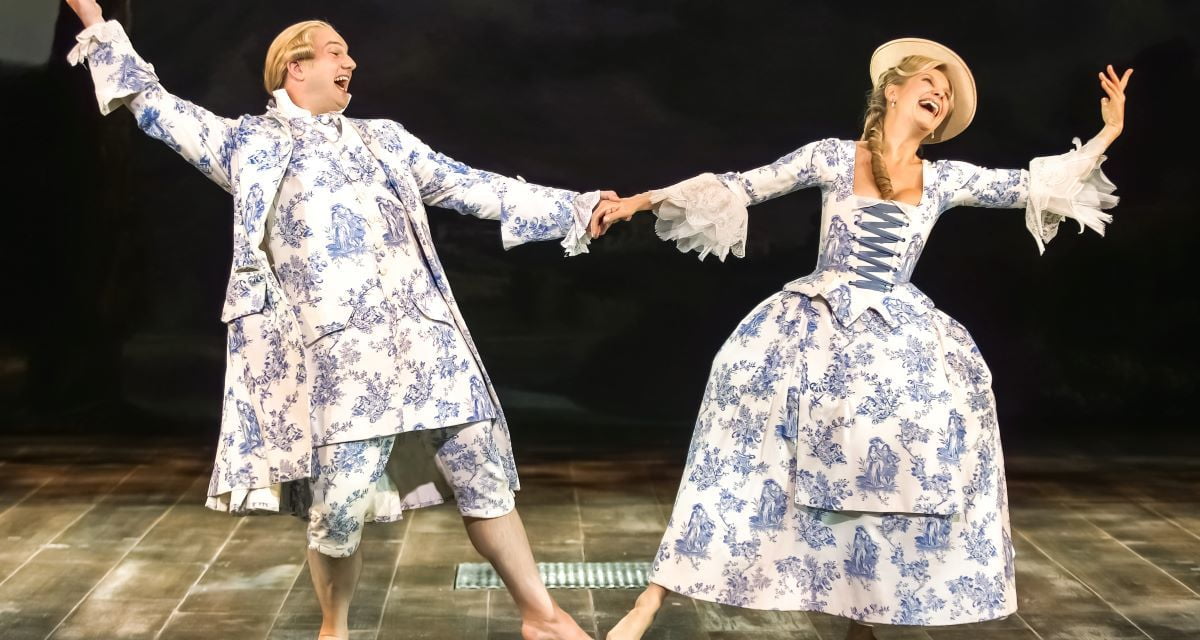It’s not often that you can describe an opera as fun. The majority are pretty tragic and don’t end well for the main characters. There are of course many notable exceptions – Mozart’s and Rossini’s comedies for example. Chief among these must be the works of Messers Gilbert and Sullivan, and English National Opera’s (ENO) production of Iolanthe is fun – huge fun in fact.
Iolanthe hasn’t caught the public attention in the same way as Pirates of Penzance or HMS Pinafore, perhaps because of its more fantastical elements. But on the basis of this revival it deserves to.
Iolanthe is a fairy who has committed the cardinal fairy sin by marrying a mortal. The fairy queen takes pity on her and commutes her death sentence to banishment, if she agrees to never see her husband again. ‘Marry’ here seems to be something of a euphemism and our amorous troupe of fairies are very keen to ‘marry’ a mortal – much to the consternation of many of the mortals.
It turns out that just after abandoning her husband forever, Iolanthe gave birth to a son, Strephon, around whom – now all grown up – the plot of this satirical farce revolves. He is engaged to the beautiful Phyllis, but she is a ward of the chancery and can only marry with the Lord Chancellor’s permission. Unfortunately he is in love with her himself, as is the entire House of Peers.
A series of misunderstandings, mistakes, misrepresentations and reversals ensues, with Phyllis breaking off her engagement and becoming betrothed to two of the Peers – she doesn’t care which she marries, leaving the choice to them, although they seem more interested in each other. Iolanthe breaks the law again to save her son and is condemned to death. But the Lord Chancellor comes up with a plan.
Will the broken-hearted Strephon be reunited with his love? Will Iolanthe escape her fate again? And just who is Strephon’s father? All will be revealed in good time.
Cal McCrystal’s production is simply delightful, skilfully marrying absurdity with Gilbert and Sullivan’s biting satire. There’s a host of verbal and visual jokes, from slapstick that wouldn’t look out of place in The Three Stooges to some very suggestive double entendres.
There’s also a lot of silliness. A pantomime cow crosses the stage a couple of times with no explanation, while a pantomime horse leaves the audience in no doubt as to its opinion of “little Conservatives”. Sheep are pushed on stage by stagehands all in black with even their faces covered, resulting in some highly entertaining pratfalls.
Lizzie Gee’s choreography is excellent, with some impressive acrobatics as well as well executed group dances.
None of this humour is subtle and it could easily have distracted from the opera itself, but it doesn’t. This is testament both to McCrystal’s direction and the performers’ talent. The scene with the sheep being pushed on and off stage happens during Strephon and Phyllis’s love song, None Shall Part Us, yet the singers, baritone Marcus Farnsworth and soprano Ellie Laugharne respectively, manage to preserve the duet’s passion.
Laugharne, particularly, is an excellent comic actor, with great timing and a very expressive face. Her short coloratura section is equally impressive. But it’s hard to pick a standout performance. Farnsworth is an appealing Strephon. Bass-baritone John Savournin makes for a rather young Lord Chancellor, but he is a powerful presence with a voice to match and excellent diction.
Mezzo-soprano Samantha Price is in fine form as a pirouetting Iolanthe, combining great comic physicality with some genuinely poignant singing. Fellow mezzo, Catherine Wyn-Rogers is a warm-voiced and commanding – and occasionally airborne – Queen of the Fairies.
The opera’s satire hasn’t been lost among all this fun and feels just as relevant today as at its 1882 premiere. The suggestion that entry to the House of Peers should be decided by competitive exam is met with collective shock and horror by the peers; when it’s voted through, the peers are happy enough to be transported to fairyland because they’re now jobless.
There are some modern additions with a Nadine Dorries lookalike desperately trying to get into the House of Peers, until she’s dragged away by a man with very familiar floppy blond hair. McCrystal also takes the opportunity to comment scathingly on the Arts Council decision to cut ENO’s funding.
The music is simply stunning, fizzing and sparkling under Chris Hopkins’s conducting.
The production also looks stunning. The sets are amazing. The opera opens in what looks like Titania’s bower. The steam engine that marks the entrance of the peers is incredibly clever. The costumes are equally beautiful.
This production really is great fun, with some laugh-out-loud jokes and even an audience singalong. I left the Coliseum with a smile on my face. It would make for an excellent introduction to opera or a family day out. It’s 2 hours and 50 minutes with a 20-minute interval. It runs to 25 October. Tickets are available from ENO.
Image
Baritone Marcus Farnsworth and soprano Ellie Laugharne as lovers Strephon and Phyllis respectively in ENO’s revival of Cal McCrystal’s Iolanthe.

